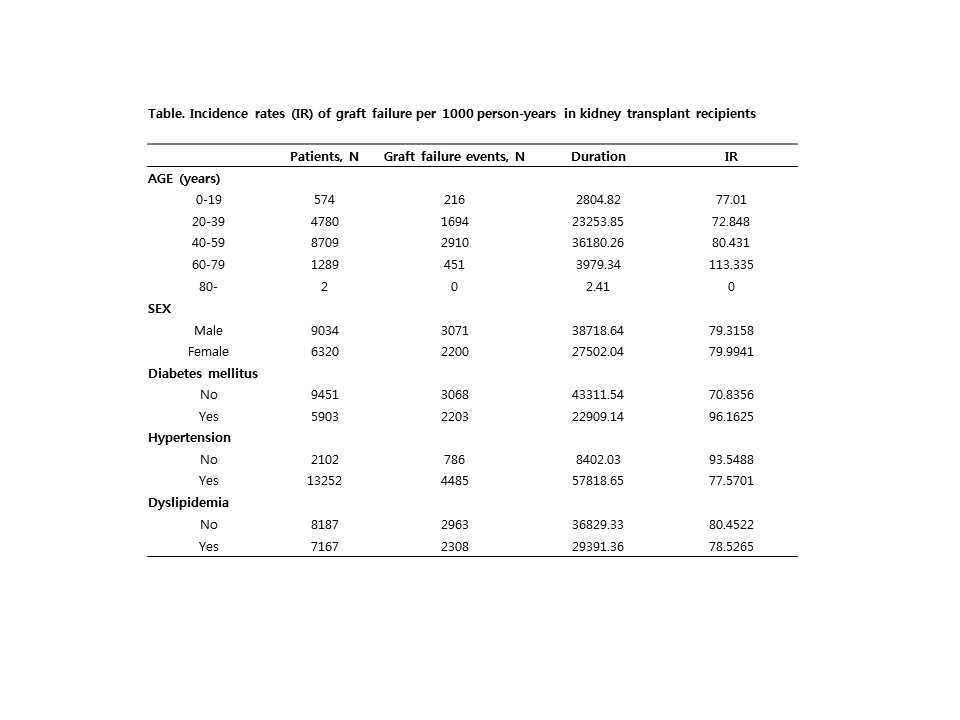Effects of Co-Morbidities on Kidney Transplantation Outcome in South Korea: A Nationwide-Population Based Study
1Hanyang University Guri Hospital, Guri, Korea, Republic of, 2Seoul National University Hospital, Seoul, Korea, Republic of, 3College of Medicine, Catholic University, Seoul, Korea, Republic of
Meeting: 2019 American Transplant Congress
Abstract number: C82
Keywords: Graft failure, Kidney/liver transplantation
Session Information
Session Name: Poster Session C: Kidney Complications: Late Graft Failure
Session Type: Poster Session
Date: Monday, June 3, 2019
Session Time: 6:00pm-7:00pm
 Presentation Time: 6:00pm-7:00pm
Presentation Time: 6:00pm-7:00pm
Location: Hall C & D
*Purpose: Kidney transplantation (KT) has become the most effective treatment for end stage renal disease. Improvement of general medical care as well as immunosuppressive agents has contributed to the superior prognosis of KT. We aim to investigate the epidemiologic characteristics of KT recipients and effects of co-morbidities on graft failure in South Korea using a nationwide data.
*Methods: The nationwide cohort assessed in this study included KT recipients from January 1, 2002, to December 31, 2015. We analyzed the demographic data of KT recipients and their underlying diseases including diabetes mellitus, hypertension, and dyslipidemia. Additionally, we defined graft failure as the date of return to dialysis after the first 90 days of kidney transplantation. Incidence rates (IR) per 1,000 person-years by age, sex, and underlying diseases were calculated to evaluate the risk of graft failure in KTR.
*Results: A total of 15,354 KT recipients were analyzed including 9,034 men and 6,320 women. The mean age was 45.86±12.48 years. Among them, 86.7% had hypertension, 46.7% dyslipidemia, and 38.4% with diabetes mellitus. Temporal trend of demographic factors revealed that KT recipient became older, had more diabetes and dyslipidemia, especially in men. Sex ratio of KT recipients was not changed with time. The IR of graft failure was 79.5 per 1000 person-years of KT. Table 1 showed the IR by age categories, sex, and underlying diseases. Graft failure was most commonly observed in the 60-79 year old recipients. There was no difference in graft failure according to sex. Particularly, among co-morbidities, recipients with diabetes mellitus showed a higher incidence of graft failure than those without. Hypertension and dyslipidemia did not affect the graft failure.
*Conclusions: Over 12 years, KT recipients with diabetes mellitus have been increased especially in men. Moreover, diabetes mellitus elevated the risk of graft failure in South Korea. Further studies should be warranted to clarify the cause of graft failure in KT recipients with diabetes mellitus.
To cite this abstract in AMA style:
Yu M, Park S, Moon J, Jeong J, Kim J, Kim Y, Han K, Kim Y, Lee H. Effects of Co-Morbidities on Kidney Transplantation Outcome in South Korea: A Nationwide-Population Based Study [abstract]. Am J Transplant. 2019; 19 (suppl 3). https://atcmeetingabstracts.com/abstract/effects-of-co-morbidities-on-kidney-transplantation-outcome-in-south-korea-a-nationwide-population-based-study/. Accessed February 16, 2026.« Back to 2019 American Transplant Congress

